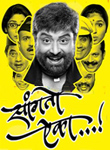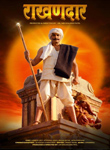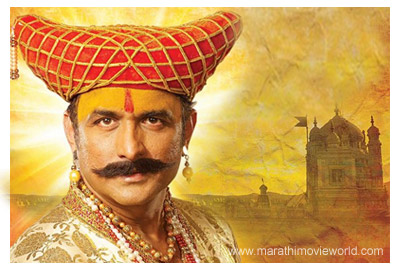‘Lokmanya-Ek Yugpurush’ is an ideal and timely gift for the new year
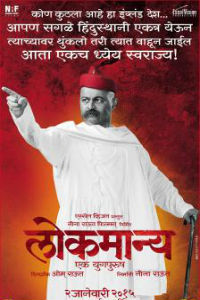 Rating: ★★★ ½
Genres: Drama Censor: U/A Duration: 120 mins Studio/presenter: Neena Raut Films, Emmay Entertainment Producer: Neena Raut Director: Om Raut Writer: Om Raut, Kaustubh Savarkar Lyrics: na Music: Ajit-Sameer Cinematographer (DOP): Prasad Bhende Cast: Subodh Bhave, Sameer Vidwans, Chinmay Mandlekar, Priya Bapat Kamat Movie Review by: Keertikumar Kadam |
Through our school text books, we have learned that Lokmanya Bal Gangadhar Tilak , led India’s freedom struggle . A committed Journalist, Teacher, Social Reformer, Lawyer, and a dynamic freedom fighter; he was all in one.
Presented by Essel Vision and produced under the banner of Neena Raut Films ‘Lokmanya, Ek Yugpurush’ is a latest Marathi movie, which reminds the thoughts of late Bal Gangadhar Tilak. The movie comments on the socio-political situation in India today, with a Voiceover narration in the beginning of the movie, by Nana Patekar in his typical style. The movie starts with a court scene, where Tilak is being tried and then goes into flashback, to unfold the life and times of Lokmanya Tilak.
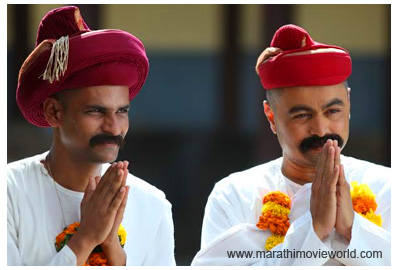
So, we find Tilak (Subodh Bhave) returning from Bombay after studying law degree , only to start a school for the local people, with the help of his friend, Agarkar (Sameer Vidwans). Both manage to open New English School. The movie has shown two eras, one being the film’s subject era and the other being today’s time. However, both relate to each other. Makarand ( Chinmay Mandlekar) is a young journalist, who gets fascinated by Tilak’s thinking, after reading books on him, but in the process, ignoring his would be wife- Samira (Priya Bapat Kamat). He becomes more and more idealistic, with the thoughts of Tilak- like, “Swarajya mhanje swakiyanche rajya!”
The film has shown the ruthless ways of British officer Rand , to deal ‘plague’, which hit Poona, during his time. Then, the officer being killed by Damodar Hari Chaphekar with the knowledge of Tilak, is also shown skilfully. The film also elaborates on Tilak’s hard hitting writings against the rulers and justifying Britishers’ killings through his newspaper; which lands him in jail and is sentenced to rigorous imprisonment of six years outside the country in Mandalay, Burma. (1908-1914).
Story by Om Raut & Kaustubh Savarkar is well researched. But, highlight of the movie is its screenplay and dialogues . Art direction (Santosh Phutane) and costume department (Mahesh Sherla) have complimented camera work of Prasad Bhende. Interesting lighting and camera angles add beauty to the frames. Music (Ajit-Sameer) is an asset, as the songs escalate the drama in story telling. Background music is noteworthy. Editor (Aashish Mhatre, Apurva Motivale) and the director have worked beautifully hand in glove and it shows in scene cutting.
Director (Om Raut) makes his presence felt from the very first scene onward. He has merged two time-periods in excellent fashion. Only faltering being, movie should have ended on a high note on, ” Swarajya ha maza janmasiddha hakka aahe, aani to mi milavinarch”, the line Tilak is identified with. Subodh Bhave has marvelled as Tilak. He has used his voice to greater effect with modulations depicting different emotions. Sameer Vidwans as Agarkar is very convincing. Chinmay Mandlekar has promisingly portrayed the thought process of today’s youth . He is well supported by Priya Bapat Kamat. There are many more characters played by actors. Thanks to the makers, for a very good New Year’s gift in the form of ‘Lokmanya, Ek Yugpurush’.
‘Avtarachi Goshta’ speaks about other side of faith
|
Rating: ★★★
Genres: Drama Censor: U/A Duration: 120 mins Studio/presenter: Asian Entertainment Producer: Sachin Pandurang Salunkhe Director: Nitin Dixit Writer: Nitin Dixit Lyrics: na Music: Gandhaar Cinematographer (DOP): Nagaraj M.D. Cast: Adinath Kothare, Mihiresh Joshi, Yash Kulkarni, Sulabha Deshpande, Leena Bhagwat, Sunil Abhyankar, Rashmi Khedekar Movie Review by: Keertikumar Kadam |
In the past, we have seen many famous plays and films, opposing blind faith. Recently, there was a film ‘OMG’ which openly challenged the blind faith. Last week released Hindi film, ‘PK’, was also an advanced version of such a plot. And now, the recent Marathi movie Avatarachi Goshta produced by Sachin Salunkhe and director Nitin Dixit , has also tried to make a comment on superstition & miracles, in today’s advanced world based on science.
Set on the backdrop of a small town in Maharashtra, the film shows two school going friends, Kaustubh (Mihiresh Joshi) and Mangya (Yash Kulkarni), living their normal lives, like other children from small towns. Kaustubh being fond of listening to mythological stories from his Grandmother (Sulabha Deshpande), starts believing that after nine reincarnations of lord Vishnu, he is the chosen one for the tenth reincarnation, to end the miseries of mankind on the earth. Mangya, being a strong believer in Koustubh, supports his belief and both start noticing unusual happennings as miracles. Kausthub also starts believing in his superpowers.
Kaustubh’s family, comprising of mother ( Leena Bhagwat), father (Sunil Abhyankar), Grandmother( Sulabha Deshpande) and adolescent sister Shweta (Rashmi Khedekar), are unaware of this development. When Mangya is convinced that Kaustubh possesses the power of God, he encourages him to jump into a pit. In this attempt, Kaustubh fractures his leg. As a result of which, he turns violent against all family members, including Mangya. At this stage, Amod (Aadinath Kothare) the paying guest living with Kaustubh’s family, plays an important role, explaining Kaustubh the coincidental miracles and rationalizes them with convincing examples. Kausthub too realises the futility of his belief.
![]()
The limited story is by Nitin Dixit ( Dhag fame); who also has written the dialogues and screenplay, besides directing the movie. Though his screenplay and dialogues are of high quality, they have limitations due to thin story-line. The film however shows promise, with suitable mythological narration in the opening part and achievements of scientists in the credits in the end. The film has become slower in the interior part. Camerawork by Nagraj Diwakar aptly captures the tone of the story and settings, giving it a real and authentic look. Missing love-angle doesn’t give scope to music by Gandhaar, though the songs are good. However, the background music is far better and does justice to the story telling.
Aadinath looks cute and boyish and has delivered ably, what was expected from him, but he has been wasted in the first half. However, in the second half, director has given his character maximum scope. Also, very cleverly , he has shown the one sided love of Shweta towards Aadinath . Supporting cast is extremely good, with names like, Leena Bhagwat, Sulabha Deshpande, Sunil Abyankar, Aashish Vidhyarthi (special appearance). Child actor, Mihiresh Joshi has a central role, which he manages well by displaying various forms of emotions, through different scenes. He has been ably supported by another child artist Yash Kulkarni.
One thing is for sure that as a script writer Nitin Dixit has done a good job. No wonder, the film has bagged nine awards in various categories, at different popular awards and festivals. But, as a director, he needs to work harder.
Socially aware individuals should join ‘Candle March’
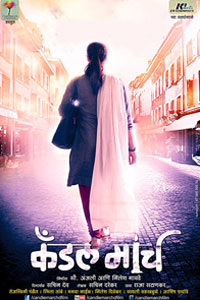 |
Rating: ★★★
Studio / Presenter: Chanakya Creations, K4 Enterprises Producers: Anjali Thatte-Gawde, Nilesh Gawde Director: Sachin Deo Writer: Sachin Darekar Director of Photography: Raja Satankar Music Director: Amitraaj Cast: Manva Naik, Smita Tambe, Tejaswini Pandit, Sayali Sahastrabuddhe, Nilesh Diwekar, Ashish Kulkarni, Ashish Patode, Chandrakant Lokare Movie Review by: Keerti Kadam |
In everyone’s life there’s a woman, in the form of a mother, sister, friend, wife. But, sadly enough even in 21st century she becomes a victim of abuse, not only in India but worldwide. Every woman has been gifted by god with a special sense, to distinguish the intention of look and touch of the opposite sex, e.g. touch of love, blessing, affection, and also lust. ‘Candle March’, presented by Chanakya Creations, in association with K4 Enterprises and produced by Anjali & Nilesh Gawde, has handled the subject of sexual exploitation, rape in an effective way.
Sachin Darekar’s story is about the incidents of rapes happening around us. He has used real life incidents like Jalgaon Sex scandal, Delhi gangrape, Shakti mills rape case, in the story to create an impact. Shabana (Smita Tambe) is a woman leading her life in a shanty, with her children and an irritable husband (Nilesh Diwekar), whose passion is booze and beating his wife at the slightest provocation. Vidhya (Manasi Naik) is a journalist working for a TV channel, who faces sexual exploitation at every step in her career from her immediate boss. Anurata (Tejaswini Pandit), a professor of Marathi literature in a college, who accidentally happens to save a gang raped victim. She is a scarred victim in Jalgaon sex scandal. Sakhi (Sayali Sahasrabuddhe) a young collegian, who is a rape victim of an acid attack. The story unfolds through these four protagonists, fighting their individual battles of sexual abuse and all four stories get intermingled in an effective way, for a collective fight against sexual harassment and unrest.
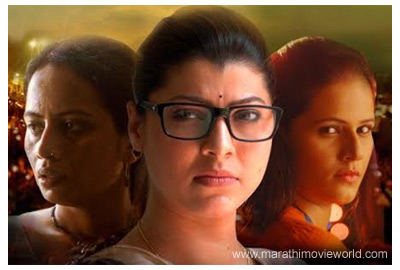
Director, Sachin Deo raises hopes right from the first frame of the movie (a dark black screen and baritone voice of Nana Patekar) and manages to hold on to keep the viewers interested in his sincere storytelling. Though the subject is ‘dark’, serious, he, without indulging in titillation, presents the subject without any gimmicks. Very beautifully he has managed to blend the scenes by ending of one scene turning beginning of the next, with splice. In this woman dominated film of four female performers, the Screenplay is so compact that eaTejaswini Pandit, Actressch scene says something and moves on without lingering even for seconds. Dialogues, which are immensely realistic, is the heart of this movie, speaking volumes in a few words. Music (Amitraaj) and Lyrics (Mandar Cholkar) are the soul of this movie and songs do almost 15-20 scenes worth talking in a hard hitting way, except for a romantic number. Background music is an icing on cake, as it lifts the film to another level. Fabulous use of ‘Aalaaps’ depicting pain, passion, plight, torment, sorrow & a variety of emotions, add value to the scenes.
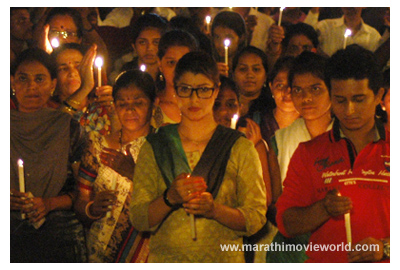
Manava Naik does justice to her role. Sayali Sahasrabuddhe gets better in second half. Smita Tambe impresses with her instinctive expressive face. Superb underplay and tremendous mental strength on a frail frame characterisation is a big plus from Tejaswini Pandit. In a crowded female cast two actors, who leave their mark impressively, are Nilesh Diwekar and Rajendra Shisatkar (as Inspector). Editing, make-up, costume departments too make their presence felt. And Nana Patekar’s opening lines are a treat to experience.
‘Viti Dandu’ – a weapon against ruthless torture
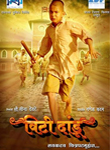 |
Rating: ★★★
Studio / Presenter: Ajay Devgn Films, Raj Radha Films Producer: Leena Deore Director: Ganesh Kadam Writer: Vikas Kadam Director of Photography: Shailesh Awasthi Music Director: Santosh Mulekar Cast: Dilip Prabhavalkar, Ravindra Mankani, Yatin Karyekar, Ashok Samarth, Mrunal Thakur, Nishant Bhavsar, Gowhar Khan, Shubhankar Atre, Radhika Deore Movie Review by: Keerti Kadam |
Winner of recently announced MarathiMovieWorld award for ‘Most Awaited Film’ category, ‘Viti Dandu’, is presented by Ajay Devgn Films and produced under the banner of Raj Radha Films by Leena Deore. Viti Dandu, which is an ancient Indian sport, possibly with origin over 2500 years ago,was a popular sports in India, till 60s and 70s.

The story (writtten by Vikas Kadam) of Viti Dandu is about affection between grandfather Daji and grandson Govind taking place in pre independence era, in a remotest village called Morgaon. Daji (Dilip Prabhavalkar) is a peace loving doting grandfather, always throwing protective wings around his grandson Govind (Nishant Bhavsar), mainly because his only son and daughter in law were killed by merciless British officials cruelly, for their involvement in India’s fight for freedom.
The grandfather bears villager’s taunts of being called ‘chamcha’ of Britishers, because he is worried about his grandson’s future in British Raj. Once, while visiting police station, Govind witnesses villagers getting thrashed by ‘Gora’ ( The name used by a revolutionary played by Ashok Samarth in the film,) and he keeps questioning Daji about it. To divert his mind Daji offers to play Viti Dandu with Govind, who loves playing that immensely. While playing, a strongly hit Viti hits a passerby on head, who happens to be the British officer, killer of Govind’s parents. The officer later dies, after suffering severe head injury, due to losing his balance after a hit. Daji panics and to save Govind from Britisher’s clutches, decides to run away, but seeing innocent villagers being beaten up blue and red, confesses to have committed that crime and gets himself jailed.
Govind unable to digest his grandfather being in jail, decides to rescue him with the help of his friends. They attack police officials with Viti Dandu, and are triumphant in the end ( ‘Bachha’ company will love it). Since it’s a pre independence era around 1943, revolutionary movement is also interwoven in the plot.
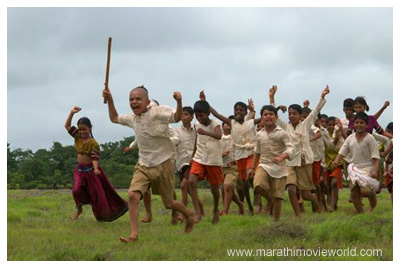
Director (Ganesh Kadam) has invested complete first half in environment creation and introductions of various characters. Even though having a thin storyline, the director has tried his best to present a sensible screenplay, till the climax of the film, which looks little filmy. The film has four songs and all of them are good, especially a Bharud song which is well composed (Santosh Mulekar), well choreographed, well photographed. Lyrics score points as they help in the storytelling. Background score excels and is effective without being imposing. Art director and costume department have been successful in creating the right time-period (pre-independence and now). DOP (Shailesh Awasthi) has done an amazing job and has beautifully captured the virgin rural beauty thus creating the right amount of required atmosphere.
Though the two main characters hog majority of the film space, there are presence-felt performances by others, like, Mrunal Thakur, Ravindra Mankani, Ashok Samarth. Yatin Karyekar is impactful in revolutionary’s role of Usmanbhai. Child actors Nishant Bhavsar, Shubhankar Atre and Radhika Devre has done a splendid job and wins hearts with his innocence. And, last but not the least, Dilip Prabhavalkar (winner of Best Actor award, announced by MarathiMovieWorld) has time and again been proving his versatility, doesn’t fail you this time too, showing different facets of the character with right amount of emotions.
All in all, a neat, clean movie, with picturesque locations and of course, Bollywood superstar Ajay Devgn as presenter.
‘Elizabeth Ekadashi’ a creative film with a difference
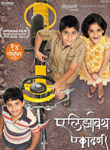 |
Rating: ★★★ ½
Studio / Presenter: Essel Vision, Mayasabha Productions Producers:Nittin Keni, Nikhil Sane & Madhugandha Kulkarni Director: Paresh Mokashi Writer: M adhugandha Kulkarni Director of Photography: Amol Gole Music Director: Anand Modak Cast: Shrirang Mahajan, Saili Bhandarkavthekar, Pushkar Lonarkar, Nandita Dhuri, Vanmala Kinikar, Chaitanya Badve, Durgesh Badve – Mahajan, Chaitanya Kulkarni, Ashwini Bhalekar, Anil Kamble Movie Review by: Sanskruti Bhatkar |
Director Paresh Mokashi’s first film ‘Harishchandrachi Factory’ was acclaimed nationally as well as internationally and had won many prestigious awards. He has now returned back after a gap of five years, with his second creative film ‘Elizabeth Ekadashi’, which has all the qualities of the world cinema and also has the local feel. This film neither has a regular ‘formula’ of a hero, heroine and villain, nor has a love story between boy and a girl.
The name of the film itself creates curiosity in the minds of the viewers. The three main characters in the film are little children, who are passionate and determined to save their bicycle ‘Elizabeth’. The whole movie has been picturized in Pandhapur, against the backdrop of Ekadashi Vaari, with the real people of Pandharpur and the devotees around.
‘Elizabeth Ekadashi’ , is a story of Dnyanesh (child artist Shrirang Mahajan) and Zendu (Saili Bhandarkavthekar) who are staying in Pandharpur, with their mother (Nandita Dhuri) grandmother (Vanamala Kinikar) and friends Ganya and Kalpit . Dnyanesh is a bright student of his school, who is fascinated with the theories of well-known scientist Isaac Newton and performs ‘Kirtan’s on ‘Saint’ Newton, which is liked by the local people. His family financially struggles a lot after the death of his father. As his mother is not able to pay the loan installments, the bank takes away her Knitting Machine, the source of her earnings; to be returned only after payment of some installments. The family struggles to collect the money for payment to the bank. Dnyanesh who is very fond of ‘Elizabeth’, the bicycle made by his father, strives hard to save her from getting sold, with the help of his sister Zendu and his friends.
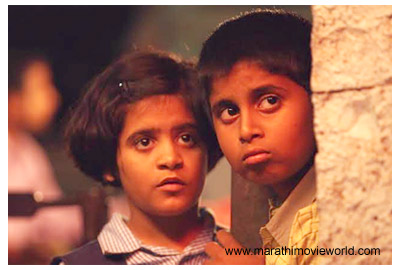
Presented by Essel Vision Productions Ltd and Mayasabha, the producers of this film are: Nittin Keni, Nikhil Sane and Madhugandha Kulkarni. The story is written by Madhugandha Kulkarni, who has written the script of TV serial ‘Honar Soon Mi Ya Gharachi’. The screenplay and dialogues are jointly written by Paresh Mokashi and Madhugandha Kulkarni, who happen to be a husband and wife pair. Paresh Mokashi has also written the songs, while the music has been rendered by late Shri Anand Modak. Brilliant Camera work by Amol Gole, suitable costumes designed by Chaitali Dongre, and editing by Abhijit Deshpande have added to the quality of the film.
Best part of this film are the fine performances by all the artistes. For stage artist Nandita Dhuri, it has been a good opportunity, to display her talent, while all the three child artistes Shrirang Mahajan, Saili Bhandarkavthekar, Pushkar Lonarkar have played their roles, remarkably well. The film’s screenplay has universal values, taking into account the struggle of the family, in absence of the head of the family, to keep the fire burning in their house. The film carries a strong message for children of all age group as well as elders. This film is likely to win many awards and is a ‘must watch’ for children and parents alike.
‘Pyar Vali Love Story’ turns ‘A 1992 Love Story’
 |
Rating: ★★ ½
Studio / Presenter: Dreaming TwentyFour Seven, Cinema Company India and STV Producers: Inder Raj Kapoor, Rekha Jayant Joshi, Deepak Pandurang Rane Director: Sanjay Jadhav Writer: Sanjay Jadhav DOP: Prasad Bhende Music Director: Amitraj, Pankaj Padghan, Samir Saptiskar Cast: Swapnil Joshi, Sai Tamhankar, Urmila Kanetkar-Kothare, Upendra Limye, Sameer Dharmadhikari, Chinmay Mandlekar Movie Review by: Ulhas Shirke |
Few years ago we saw a Hindi movie ‘1942 A Love Story’, wherein we witnessed an impressive musical love story, taking place in the midst of India’s fight for independence. Similarly, in the latest released new Marathi film ‘Pyar Vali Love Story’ , produced by Inder Raj Kapoor, Rekha Jayant Joshi, Deepak Pandurang Rane, we find a musical love story, which is set on the backdrop of 1992 communal riots in Mumbai.
The film takes you on the sets of two ‘chawls’ supposed to be located somewhere in Mumbai. Both these chawls are shown adjacent to each other, one having Hindu and the other having Muslim inhabitants. Aalia (Sai Tamhankar), stays with her parents (Ila Bhate, Nagesh Bhosale) and her brother Kaderbhai (Upendra Limaye), who indulges in street fights at a slightest provocation. But, he always has the strong support of his die hard Hindu friend ‘Pashya’ (Sameer Dharmadhikari). Then there’s a foul mouthed, but still lovable, Nandini (Urmila Kanetkar-Kothare), who is in love with Pashyabhai , and wants to marry him. Kaderbhai, who treats her as his sister, supports her. And soon we see the marriage of Pashyabhai and Nandini taking place.
Amar, (Swapnil Joshi), Pashya’s younger brother, who comes down to Mumbai for the wedding , coincidentally meets his love interest, Aalia, and it is love at first sight for him. Just when romance is budding between them, we notice a twist. Aalia’s father (a police constable) fixes her ‘Nikaah’ with his boss, police inspector, Alam, (Chinmay Mandlekar), who accidentally gets killed on the ‘Nikaah’ day. Kaderbhai suspects, it as a deliberate act by Amar, as he is aware of Amar’s affair with his sister.
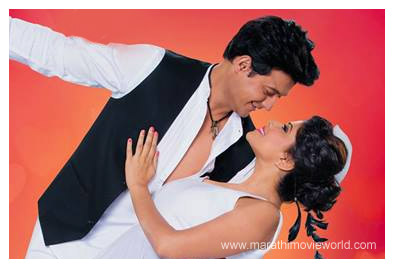
Kaderbhai vows to take revenge, which necessitates enmity with his best friend Pashya. In the meantime, Amar and Aliya run away from this riot affected place and take shelter elsewhere. And that widens the enmity between kaderbhai and Pashyabhai. Finally, all of them assemble at one place for the concluding dramatic scene of the film.
The story by Sanjay Jadhav is simple, with a clear intention of presenting intense love story. The Screenplay of the film sometimes gets wobbly, but dialogues are noticeably brilliant at some points. Most of the dialogues are in Hindi, without hampering the process of story telling. Violin pieces used in the background music try to generate romantic atmosphere. The music director trio AmitRaj, Pankaj Padgham, Samir Saptiskar, have tried to make this film more musical; but, only one song ‘Jara jara..’ is impressive. Cinematographer Prasad Bhende has cleverly captured the essence of the 90s. Art direction of Manohar Jadhav is not so impressive, as the sets of the film look average and artificial.
Director Sanjay Jadhav has given a treatment to this film, like any other Hindi commercial movie ,by packing romance, drama, emotions, comedy, fights, song and dance routines, all together. Ila Bhate, Nagesh Bhosale, Chinmay Mandlekar, Sameer Dharmadhikari, have done their jobs effectively. Upendra Limaye should have toned down his facial tissue movements. Urmila Kanetkar-Kothare has turned a scene stealer in the first half. Sai Tamhankar has an exhilarating screen presence and with each film she is turning out to be a still better performer. Swapnil Joshi can easily be called Shahrukh Khan of Marathi films, given the number of romantic films he is featuring in. He has done a swell job using the right amount of emotions.
‘Dr. Prakash Baba Amte – The Real Hero’ is a well presented Biopic
 |
Rating: ★★★ ½
Genre: Drama, Biopic Producers: Samruoddhi Cine World, Golden Globe Director: Adv. Samruoddhi Porey DOP: Mahesh Aney Studio / Presenter: Essel Vision Music: Rahul Ranade, Aniruddha Wankar Cast: Nana Patekar, Sonali Kulkarni, Dr. Mohan Agashe, Tejashri Pradhan, Sushant Kakade, Bharat Ganeshpure, Ashish Chougule, Vinod Raut Movie Review by: Keerti Kadam |
Each one of us have fantasised about superheroes, some time or the other, as a child or as an adult, to tide over our difficulties in life. A selfless person, whom we may call a social worker, actually has been working for the welfare of tribals in Maharashtra, who were living in inhuman conditions. Son of social activist Baba Amte, who throughout his life worked for rehabilitating people, suffering from leprosy, Dr. Prakash Murlidhar Amte, is a living example of Superhero. Advocate Samruoddhi Porey, national award winning director has come out with a biopic on Dr. Prakash Baba Amte.
Baba Amte (Dr. Mohan Aagashe), who set up ‘Aanandvan’ for rehabilitation of leprosy stricken patients/people, who could not afford medical treatment, takes his family for a picnic to ‘Hemalkasa’, and his elder son, Prakash, gets intrigued by seeing the plight of tribals there. Baba Amte wanted to set up facilitation centre there, but Prakash, a medico by profession, volunteers to go to Hemalkasa for the same, knowing fully well, about hardships to be faced and giving up luxuries of comfortable life. Dr. Manda (Sonali Kulkarni), newly married wife of Dr. Prakash Amte ( Nana Patekar), readily agrees to accompany him, in spite of hailing from a well to do family. In dense forest, infested by Naxalites, neglected by government authorities, they set up, with the help of few dependable associates, a medical centre in huts, where they choose to reside too. Difficulties galore like non-communication; due to alien language, age old tribal customs. But, these super human beings, bring these ‘Aadivasis’ to mainstream and even treat wild animals, as part of their family.
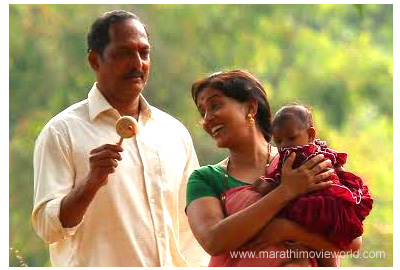
A salute to the producers, for presenting this true story in the form of a mainstream cinema. Thanks to Director for handling this sensible subject with sincerity and maturity. The screenplay, with true life incidents is compact and does not keep lingering. Dialogues are the backbone of this script and lift it to another level. They throw light on realities with subtle humour interspersed. Incidentally, each scene says something, to make you think and that’s a plus. The director is successful in maintaining the required pace in storytelling and with some witty dialogues, this serious subject doesn’t become boring. Music (Rahul Ranade, Aniruddha Wankar) has little importance, but is apt and doesn’t halt the pace of the film. Background score is noteworthy, creating required impact. Cinematography (Mahesh Aney) is engrossing with different angles capturing raw forest beauty. Dr. Mohan Aagashe has convincingly portrayed Baba Amte. Sonali Kulkarni has rendered a sterling performance as Dr. Manda, wife of Dr. Prakash Amte. A loving wife, mother, doctor, caretaker, supporter of husband’s every decision, she moves through the frames with utmost ease.
Nana Pateker as Dr. Prakash Baba Amte towers above everyone and is outstanding. His empowering portrayal of Dr Prakash Amte is, as if he is conveying his own story. To act simple is the most difficult thing and Nana does it explicitly. He has fiddled with humour in an expansive way so that seriousness doesn’t overpower the scenes. He is so perfect. This can be termed as one of his best performances.
All superficial superheroes make way, The Real Hero is here, Dr. Prakash Baba Amte.
‘Sanngto Aika’ in an entertaining Socio – Political film
|
Rating: ★★★ ½
Studio / Presenter: Landmarc Production Writer: Parag Kulkarni Director: Satish Rajwade DOP: Suhas Gujarathi Music: Avinash-Vishwajit Cast: Sachin Pilgaonkar, Bhau Kadam, Vaibhav Mangle, Pooja Sawant, Sanskruti Balgude Genre: Drama Movie Review by: Keerti Kadam |
Landmarc Production’s new Marathi film ‘Sangto Aika’ (which Sachin claims as his comeback film), has hit the theatres on 2nd Oct ’14. The background of this film is that, Kambalwadi’s beloved leader Annasaheb Thorat’s statue is to be unveiled. But some miscreants put a garland of shoes on it ; which sparks a big trouble.
Annasaheb’s two unscrupulous sons, (Jaggannath Nivangune, Milind Shinde) who don’t see eye to eye with each other, try to seize this opportunity, to gather political mileage out of it. A newly appointed sub inspector ( Bhau Kadam) announces that within 24 hours the culprit will be booked, else he, along with his senior constable, (Vaibhav Mangle) is prepared for a donkey ride in birthday suit.
To save their face, they catch hold of an innocent person, ‘Aambat’, ( Sachin Pilgaonkar) who most of the time is in inebriated state, but is die hard performer, comedian, a ‘Songadya’, and also a part time ventriloquist by profession. To fulfil individual political ambitions, both the sons try to manipulate ‘Aambat’. In the process ‘Aambat’ loses the trust of his wife (Sanskruti Balgude) and doting six year old son, (Shubham Parab), who says ‘ You are no longer my hero’.
His son being his weakness, ‘Aambat decides to get himself exonerated, by using his presence of mind and wit. Does ‘Aambat, manage to tackle two warring brothers who are after his throat, and whether he is successful in emerging as a hero in his son’s eyes? To find the answers, please watch the film ‘Sanngto Aika’.
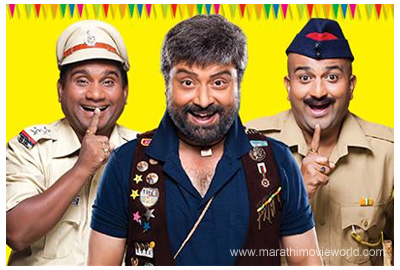
Putative director Satish Rajwade ( Eka Premachi Goshta, Mumbai Pune Mumbai fame) has presented a different genre, i.e. comedy with drama, this time and is succinct in storytelling. He is successful in maintaining the pace with interwoven emotions and not letting the comic moments go out of hand. Debutant producer Vidhi Kasliwal, being associated with renowned ‘Rajashri Production’ earlier, has infused high production values, so as not to lag behind any Hindi film. Story and screenplay (Parag Kulkarni) gets a strong boost with the dialogues, (Sanjay Pawar) which are hard hitting as well as witty. DOP Suhas Gujarathi camerawork is noteworthy. Music director duo Avinash-Vishwajit’s music is already a chart buster. Songs by Sachin and Urmila Dhangar stand out.
Vijay Chavan, Jaggannath Nivangune, Madhav Abhyankar, Pooja Sawant (she has good screen presence), have done their jobs as per the requirement of the script. Shubham Parab, though has very little screen space, wins hearts with his expressive face. Milind Shinde justifies his character and is very good in a scene before TV camera. Vaibhav Mangle scores in his scenes with his witty dialogues. Bhau Kadam is hilarious with his innocent face along with his typical (person not good in but want to talk in English) English dialogues/accent. Sanskruti Balgude is being introduced in this movie. She is a marvelous dancer and emotes well. And last but not the least, evergreen Sachin Pilgaonkar, has marveled as a performer. Singing beautifully, dancing gracefully, acting effervescently, everything he does with flair and his pairing with Sanskruti’s does look good on screen, not mismatching at all. It’s laudable that a person can be so enthusiastic even after spending half a century on screen.
All in all this socio-political-satirical-comedy film is a good watch. It’s highly advised to listen to Sachin in ‘Sangto Aika’.
‘Rakhandaar’ says, “Yalkot Yalkot Jai Malhar….”
|
Rating: ★★
Studio / Presenter: Surya Film Creation Producer: Dr. Mrunalinni Patil Director: Dr. Mrunalinni Patil DOP: Jehangir Chowdhury Music: Kanak Raj, Sameer Phaterpekar Cast: Ajinkya Deo, Jitendra Joshi, Anuja Sathe, Satish Pulekar, Ravindra Mahajani, Hansraj Jagtap, Anup Choudhary Genre: Drama Movie Review by: Keerti Kadam |
Surya Film Creation’s new Marathi movie ‘Rakhandaar’, which was in news recently, is releasing on 26th Sept ’14 all over Maharashtra. In this world, some feel that God is to be felt within, while the atheists question about existence of God. Producer, Director Dr. Mrunalinni Patil, has toyed with this idea, in her latest film ‘Raakhandaar’.
A simpleton, Sadanand Lokre (Jitendra Joshi), is an innocent person, who believes in helping his neighbours without any expectations. But, in the process, loses his job and starts working in his late father’s shop as a cobbler, with the only thought in his mind, ‘work is worship’. Khushaba (Ajinkya Deo), appears in the scene, as a villager with his special attire, and meets Sadanand, who realizes and believes that Khushaba is godly personality.
In comes, Australia returned Madhavi (Anuja Sathe), who falls in love with the innocence of Sadanand and they get married, defying Madhavi’s father’s wish of she getting married to the Manager in his office. Later, she gives birth to a son. Just before that Sadanand prays to God, for a son. But, unaware of her husband’s wish, Madhavi promises a return gift to God, that she shall return the same back to him.
There’s a villain in the form of Manager, (Anup Choudhary), who is bent upon marrying Madhavi, who tries, in vain, to spoil her marital bliss; with his childish acts. Khashaba – the Raakhandaar, of whom Sadanand & Madhavi’s son Chhota- Malhar (Master Shreeveer Kadam), also gets extremely fond of; affectionately calls him Devappa, who is always there to rescue our Sadanand whenever in trouble.
The story by Anand More, is a bit lengthy and screenplay also bit patchy. Some scenes erupt abruptly, without any connection to previous scene. Editing should have been handled a bit professionally. Jitendra Joshi does justice to Sadanand, with his innocent face and his couple of one-liners do collect laughter. Anuja Sathe has done very well, as bubbly as well as serious Madhavi and has good screen presence. Ajinkya Deo who plays Raakhandaar, looks handsome in this character and has done justice to his role. Music (Kanak Raj, Sameer Phaterpekar) is saving grace of the movie and filming of songs is very good. Background score of Sameer Phaterpekar, is apt.
Cinematographer Jehangir Choudhary is successful in capturing the required mood of the film. Director, Dr Mrunalinni Patil has tried to camouflage fiction with drama, with some philosophy thrown in. There’s always a next time. Jai Maharashtra. Jai Malhar…..Yalkot Yalkot Jai Malhar.
PorBazaar – Children saving children’s lives.
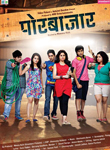 |
Rating: ★★ ½
Studio / Presenter: Video Palace, Ashwini Darekar Producer: ARD Entertainments Director: Manva Naik DOP: Dhananjay Kulkarni Music: Shailendra Barvet Cast: Sai Tamhankar, Satya Manjrekar, Dharmaj Joshi, Sakhil Parchure, Swarangi Marathe, Anurag Varalikar, Swanand Kirkire, Ankush Chaudhari Genre: Drama Movie Review by: Keerti Kadam |
Until recently, Marathi cinema was concentrated upon limited subjects like family dramas, Tamasha, comedy and politics. But the new Marathi films are now attempting a variety of topics, such as farmers’ suicides (Gabhricha Paus), pains and gains of college life (Duniyadari) adult love (Premachi Goshta) and Prem Mhanaje Prem Mhanaje Prem Asate ), social injustice and oppression (Jogwa Dhag and Fandry), success story of a mentally challenged girl (Yellow), youths involvement with underworld (Rege) etc. The new film ‘Por Bazaar’ has touched upon yet another new subject, of ‘child trafficking’. With an ‘Item’ song choreographed and filmed beautifully on the current heartthrob Swapnil Joshi ‘Por Bazaar’ opens up with increasing expectations about the film.
It’s a story of five youngsters, who enjoy bunking classes from college and often frequent lonely places together, on the outskirts of the city. On one such gallivanting session, they accidentally come across a forlorn bungalow and sense some dubious activities around it. When they attempt to find out, they are shocked to know that lots of young children are there in captive state. Upon discussing the matter with their professor, they are still astonished to know that it’s a case of child trafficking, which is second largest racket in the crime world, wherein children are molested, used for illegal drugs delivery, begging, sexual abuse etc. In the absence of getting genuine police help, they decide to help those helpless children, on their own. They are ultimately able to launch their own rescue operation and are successful in the venture, after conquering over the villain.
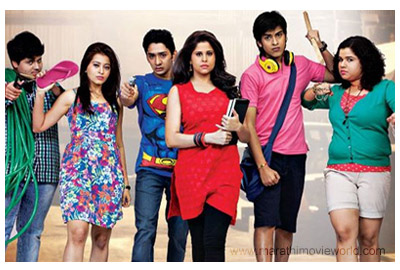
The plot sounds very easy and has been shown in the film in the same easy and simple manner, although in real life it could be the contrary. In fact, the story idea is brilliant, but fails to create the desired impact on screen. First half of the film gives the feel of a documentary. Director Manava Naik, who has a degree in film making from New York Film Academy, has kept the story telling simple and straight forward without using any gimmicks. The movie had initially created a buzz, due to involvement of the offspring of famous Marathi film stars, debuting in it.
‘Por Bazaar’ has been presented by Video Palace and Ashwini Darekar and produced by ARD Entertainment. Mahesh Manjrekar’s son, Satya, who has portrayed today’s ‘headphone plugged’, ‘minimal conversation’ youth, quite nicely. Atul Parchure’s daughter, Sakhil shows promise and the director should have used her tomboyish character more effectively in the climax. Swarangi, grand daughter of Ram Marathe, has essayed, with enthusiasm, today’s college pair, along with Anurag Warlikar. Manoj Joshi’s son Dharmaj is effective in lighter moments.
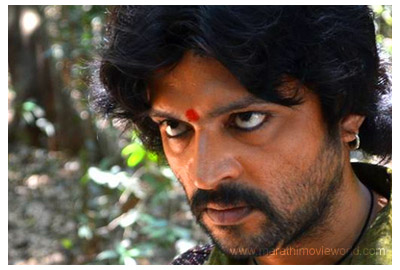
Ankush Chaudhary, playing a baddy, uses his Base voice to create villainous effect. Sai Tamhankar, who plays a college professor helping her students in their endeavour, displays required maturity of the character and steals the show in all the frames. Prajakta Dighe, Swanand Kirkire (yes, the same), Chitra Nawathe, do their jobs with ease. Chinmayee Sumeet looks convincing in a doting yet worrisome mother of today’s young children. Music director Shailendra Barve has very well adorned the beautiful lyrics of Guru Thakur, especially the first and last song. Background score is appropriate and suits the situations, also DOP Dhananjay Kulkarni is successful in capturing right mood of the movie.
Overall, ‘Por Bazaar’ fails to live up to the expectations initially created by the film. However, its theme of ‘children saving children;s lives’ is to be appreciated.
